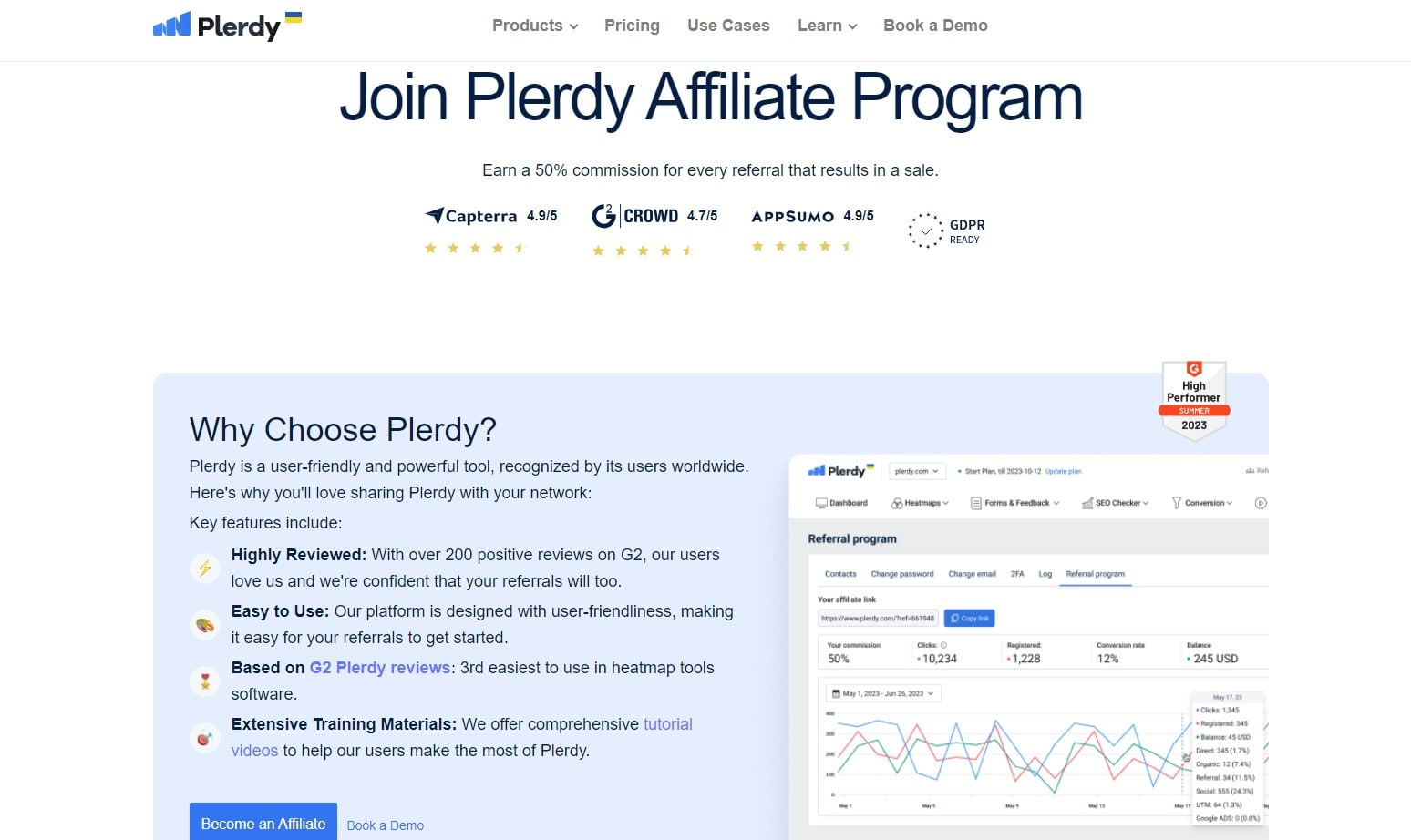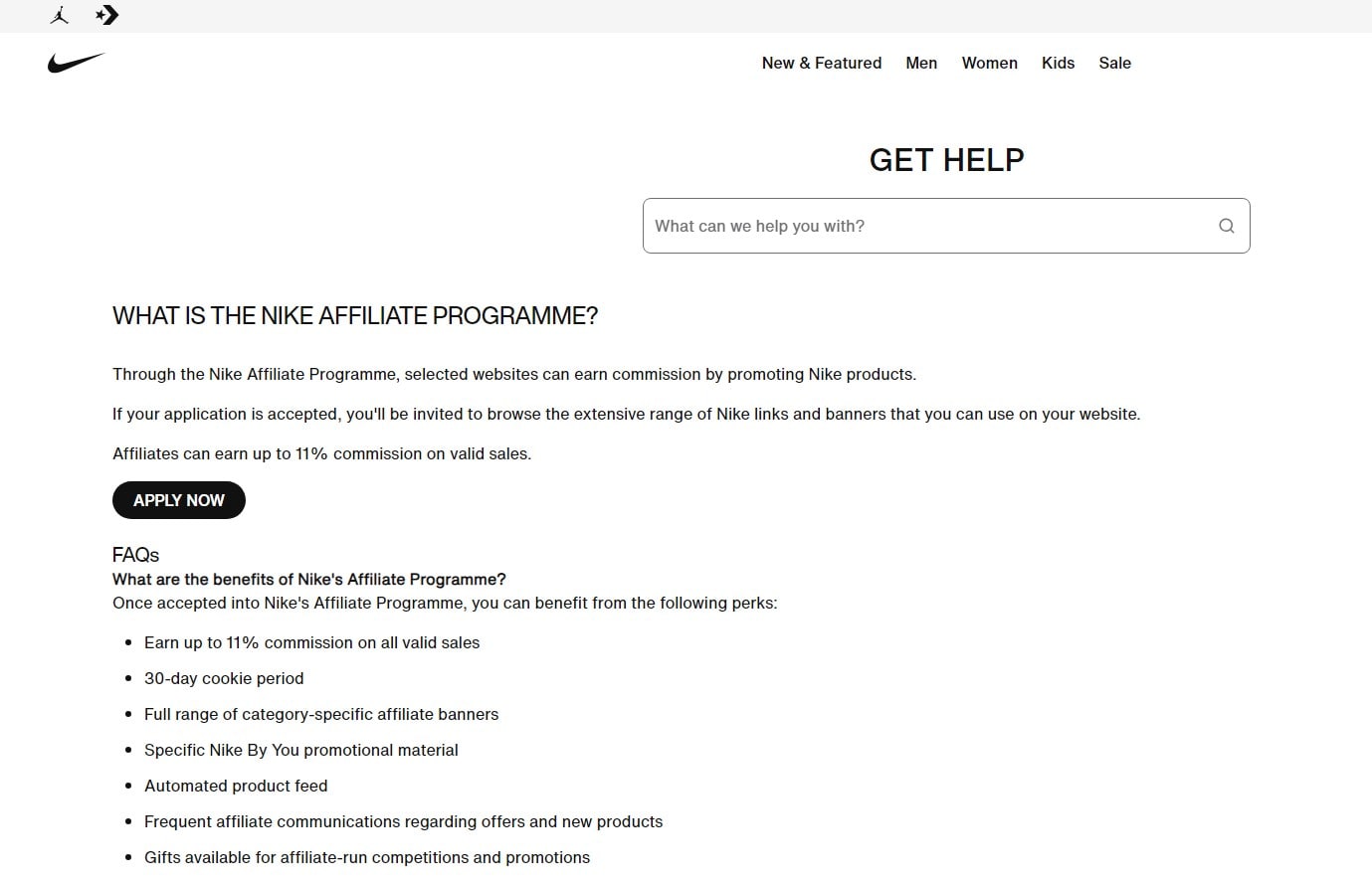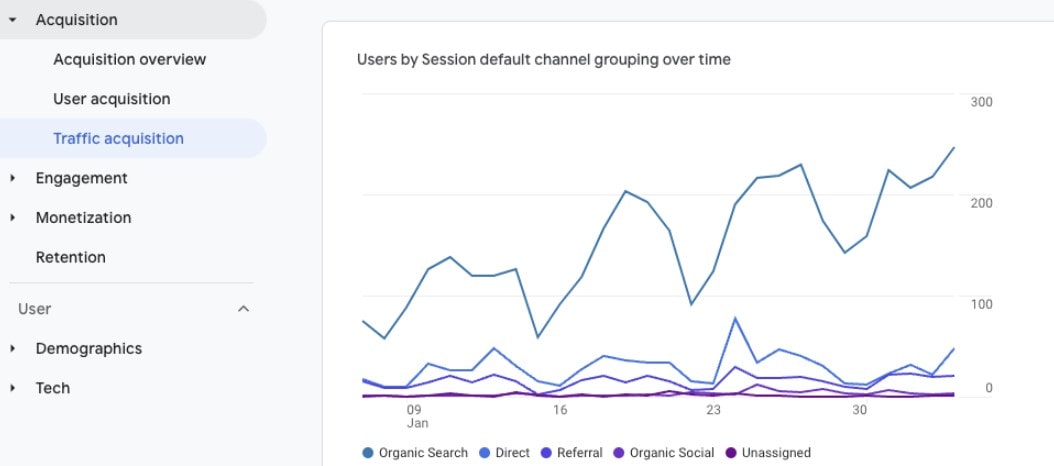Welcome to the exhilarating realm of affiliate marketing! ? When executed properly, this marketing strategy empowers individuals and companies to generate income by promoting third-party products. It’s a thrilling ride through the bustling landscapes of digital sales and online partnerships.
Imagine you run a fitness blog. ? You then collaborate with a company selling sports equipment and receive a unique link to their store. You earn a commission every time your readers click on this link and purchase.
Key points about affiliate marketing include:
- Earning a commission on each sale through your unique link.
- Marketing products that align with your niche or audience’s interests.
- Working with companies offering affiliate programs.

And guess what? Tools like Plerdy can make your journey smoother. This tool offers robust solutions for conversion rate optimization (CRO) and user experience (UX) improvement. This could be your secret ally in your affiliate marketing venture!
So, strap in and dive deep into the captivating world of affiliate marketing. The journey promises to be both informative and profitable! ⚡
Join Plerdy Affiliate Program
Join the Plerdy Affiliate Program and step into a rewarding journey that merges powerful usability, superior design, and a captivating user experience. Plerdy boasts a reputation of a software giant with over 200 five-star reviews on G2.

When you join Plerdy’s affiliate program, your commitment to share Plerdy’s excellence will yield a fruitful 50% commission on each referral that successfully converts into a sale. Plerdy thrives on its user-friendly platform and meticulously designed UX, ranked #3 for heatmaps on G2. In addition, the ample training materials make the process even smoother.
Your unique referral link can be utilized in several niches:
- Freelancing Platforms: Incorporate your referral link into your Upwork or Fiverr profile to target potential clients.
- Blog Articles: Imbed your referral link in blog articles revolving around Plerdy reviews or website optimization guides.
- For Agencies: Offer Plerdy to your clients by embedding your referral link within your proposals.
- Email Signature: An effortless yet effective method is to add your referral link to your email signature.
Plerdy’s ready-to-use marketing assets make it incredibly easy to begin the journey. These attention-grabbing banners come in various sizes, ready to be downloaded and shared. Remember, success is rooted in sharing your link with audiences that genuinely find value in Plerdy. The more relevant the audience, the higher the chances of a successful referral.
What is Affiliate Marketing?
Step into the world of affiliate marketing, a lucrative e-commerce realm where partnerships breed monetary rewards. Within this digital ecosystem, businesses, known as merchants, connect with affiliates, who are often bloggers or influencers. This connection is designed to boost the merchant’s sales, with affiliates receiving a commission for each sale or lead they generate.
Affiliate marketing is fundamentally a task based on performance. Affiliates create engaging content about the merchant’s products or tools, utilizing their skills in UX. Armed with a unique affiliate link, they invite their audience to embark on a shopping journey. Each click that transforms into a sale brings the affiliate a step closer to a well-deserved commission.
To comprehend the essence of affiliate marketing, visualize a cooking blogger raving about a blender. She uses it in her videos, writes about it, and shares her unique link. Her followers click the link, make a purchase, and she earns a commission. This win-win scenario is a beautiful ballet of e-commerce, UX design, and content creation, choreographed for monetary success.
Components of Affiliate Marketing

Understanding the key components of affiliate marketing is crucial for unlocking its potential. These components are like the cogs in a clock—each integral to the mechanism’s functioning.
The Merchant
Also known as the creator, the seller, or the vendor, the merchant is the cornerstone of any affiliate marketing program. Merchants can range from solopreneurs to colossal conglomerates. Regardless of size, they all share a product or tool to sell. They enhance their reach by teaming up with affiliates, expanding their sales network without increasing their marketing team.
The Affiliate
The affiliate, or the publisher, is the party responsible for promoting the merchant’s product. Affiliates can be individuals or companies and have many marketing tools, including blogs, social media platforms, and email marketing lists. They want to persuade buyers of the product’s value. Affiliates are the champions of usability and user experience, leveraging their platform’s design to facilitate a seamless shopping journey.
Consider a skincare influencer partnering with a local organic beauty brand. Through her blog, social media posts, and email newsletters, she introduces her followers to the brand, showcasing the products’ benefits, and directing traffic to the brand’s website via her unique link.
The Consumer
The consumer is the final yet pivotal piece of the puzzle. Their journey begins with exposure to the affiliate’s content and culminates in a purchase via the affiliate link. The affiliate earns a percentage of the commission when a customer clicks, signs up, or buys.
The role of the consumer is intricately tied to the affiliate’s mastery of website design and user experience. A well-designed website with user-friendly navigation can enhance the consumer’s shopping experience, nudging them closer to making a purchase.
The Affiliate Network
Affiliate networks connect merchants with affiliates. These networks host a marketplace of affiliate programs, simplifying the process of finding suitable partners. They manage the relationship, track sales via affiliate links, and ensure affiliates receive their commissions.
In a nutshell, affiliate marketing is a symbiotic ecosystem where merchants, affiliates, consumers, and affiliate networks interact. It’s a dynamic dance of e-commerce, influenced by usability, and user experience, where each sale is a testament to the power of well-crafted content. Affiliate marketing embodies the future of online sales, enabling businesses to expand their reach and individuals to monetize their digital platforms. The dance floor is open—are you ready to join in?
Understanding How Affiliate Marketing Works
Affiliate marketing provides a modern twist to traditional advertising by paying rewards for referrals. The process begins when an affiliate promotes a tool or product a business offers. The promotional content contains a unique link that the affiliate shares with their audience. Clicking on this link directs the user to the business’s website. If the user makes a purchase, the business pays the affiliate a 15-50% commission. This process weaves together the principles of usability, and UX, resulting in a digital tapestry that benefits all parties involved.
Let’s explore this using an illustration. A tech blogger discusses a cutting-edge graphics card from a computer hardware business. The blog post contains a unique link directing readers to the company’s website. A reader, captivated by the blogger’s insights, clicks on the link and buys the graphics card. Consequently, the blogger receives a commission from the hardware company.
This cycle reiterates how the core of affiliate marketing is a blend of compelling content and strategic user experience. The blogger’s keen understanding of their audience and ability to create engaging content transforms their blog into a revenue-generating platform.
Types of Affiliate Marketing Channels

Affiliate marketing channels are the different platforms that affiliates use to promote products or services. These channels can be as varied as the affiliates themselves, but some common types include:
Influencers:
- Influencer marketing is a potent affiliate channel. These individuals have amassed a large following on social media platforms and leverage their popularity to promote products. An influencer’s endorsement can be extremely impactful and drive significant traffic to a merchant’s site.
- Example: A fitness influencer promotes a protein powder brand using her unique link in her Instagram bio. Her followers, trusting her recommendation, click the link and make purchases, earning her a commission.
Bloggers:
- Bloggers wield their writing prowess to create detailed reviews, tutorials, or listicles about products or services. Incorporating their unique affiliate links within these posts, they steer their readers towards the merchant’s site.
- Example: A travel blogger writes a comprehensive review about a hotel booking site, sharing their unique affiliate link. Readers, swayed by the blogger’s experience, use the link to book their next vacation, resulting in commissions for the blogger.
Email Marketing:
- Email marketers create targeted campaigns containing affiliate links. By segmenting their email lists based on subscriber preferences, they can tailor their promotions for optimal user experience.
- Example: An email marketer sends out a weekly newsletter containing book recommendations with affiliate links. Subscribers, drawn in by the personalized suggestions, click the links and buy the books, earning the marketer a commission.
Large Media Websites:
- These websites create a myriad of content that appeals to a broad audience. They pepper their articles and listicles with affiliate links, turning every click into a potential commission.
- Example: A popular lifestyle website publishes an article about top-rated kitchen appliances with embedded affiliate links. Readers, intrigued by the rankings, click the links and make purchases, generating revenue for the website.
Coupon Sites:
- These sites gather various deals and discounts, offering their visitors a one-stop-shop for savings. Their model rests on providing users a seamless experience of finding the best deals, all linked to the merchants’ sites with affiliate links.
- Example: A coupon site lists a discount for a renowned shoe brand. Bargain hunters, eager for a good deal, click the link, buy the shoes, and the site earns a commission.
In the digital economy, affiliate marketing channels offer a myriad of opportunities for individuals and businesses to earn revenue. By marrying compelling content with a deep understanding of user experience, and website design, these channels serve as powerful tools for monetization. With the right strategy, each click can unlock potential earnings, affirming the vibrant potential of affiliate marketing.
Earning Money Through Affiliate Marketing

Revenue prospects abound in the digital marketplace. One of these avenues is affiliate marketing, a method that converts the experience of a user into potential earnings.
The cycle of earning in affiliate marketing begins when an affiliate promotes a product or software. Affiliates can be bloggers, influencers, email marketers, or owners of large media websites. The affiliate’s unique link, embedded within the promotional content, directs interested users to the merchant’s website. The company pays the affiliate when a user clicks on the link and buys due to the compelling content.
For example, suppose you are a food blogger who crafts delicious recipes using a particular brand of blender. You share these recipes on your blog, cleverly embedding the affiliate link within your posts. Your readers, captivated by your culinary creations, click on the link and buy the blender. Consequently, the blender company pays you a commission. The more people buy using your link, the higher your earnings. This form of passive income is appealing to many as it allows the monetization of existing platforms and audiences.
But how much can one earn through affiliate marketing? The answer varies. Some marketers make a few hundred dollars a month, while others have amassed fortunes. Several factors affect earning potential:
- Traffic: The amount of traffic your platform can generate affects your potential earnings. More visitors equate to more potential clicks on your affiliate links.
- Engagement: The engagement level of your audience matters. Users who trust and value your content are more likely to make purchases through your links.
- Niche: The niche you cater to also affects your income. Some niches have higher commission rates than others.
- Affiliate Program: Different affiliate programs offer different commission structures. Some pay a percentage of the sales, while others offer a flat fee per sale.
The Pros and Cons of Affiliate Marketing
As with any income-generating venture, affiliate marketing has advantages and disadvantages. Let’s delve into both sides of the coin.
Advantages of Affiliate Marketing:
- Passive Income: Once you’ve created content with embedded affiliate links, you can earn money 24/7, even while you sleep.
- Low Start-up Costs: Starting an affiliate marketing venture requires minimal investment compared to other businesses. To develop compelling material, you only need a platform like a blog or social network account and time.
- Flexible Work: Affiliate marketing allows for flexible work hours and the ability to work from anywhere with an internet connection.
Disadvantages of Affiliate Marketing:
- No Control Over Products: As an affiliate, you have no control over the products or services you promote, which can occasionally lead to product quality or availability issues.
- Payment Delays: Some affiliate programs have payment terms that can delay your earnings.
- High Competition: Many niches are highly competitive, making it challenging to stand out and attract significant traffic.
While affiliate marketing has its challenges, it presents a unique opportunity to monetize your platform. Leveraging UX design, delivering an exceptional user experience, and focusing on usability can pave the way for success in this exciting digital venture. It may not be a quick road to riches, but with strategic planning and execution, affiliate marketing can be a fruitful way to earn money in the digital age.
Getting the Ball Rolling with Affiliate Marketing

Selecting a successful niche, finding the correct advertising products, creating a strong platform, and joining an affiliate network make up an affiliate marketing plan.
To pinpoint a lucrative niche, study the market, observe trends, and identify what your audience seeks. Then, select products or tools that align with your chosen niche and audience interests. For instance, if you’re running a fitness blog, you could promote workout gear, supplements, or health apps.
The platform you choose to reach your audience is a crucial decision. Websites, blogs, and social media platforms offer distinct advantages and appeal to varied audiences. Instagram, with its visual-heavy interface, suits lifestyle and fashion affiliates. Meanwhile, tech and gadget affiliates might opt for a website or YouTube to provide detailed product reviews.
Once you have your platform, you need to signup and join an affiliate program. These programs provide the affiliate links you’ll use to earn commissions. Amazon’s affiliate program is popular due to the extensive range of products. In contrast, ClickBank is famous for its digital products, and CJ Affiliate provides a massive network of companies from various industries.
Remember, crafting engaging content is the lifeblood of your affiliate marketing endeavor. Whether it’s compelling articles, intriguing infographics, or captivating videos – your content should build trust and urge the target audience to click on your affiliate links.
Legal Framework in Affiliate Marketing
Compliance with the law is not optional but mandatory in affiliate marketing. Legal mistakes can lead to fines, lawsuits, and a tarnished reputation.
At the top of the legal considerations is disclosure. The Federal Trade Commission (FTC) mandates that affiliates disclose their relationship with merchants to their audience. You must inform your audience if you’re making money from the links you share. Failure to provide this transparency could lead to FTC penalties.
Disclosures should be explicit and obvious.
“This post contains affiliate links, and I earn a commission if you purchase through these links, at no cost to you,” is a common phrase.
This disclosure should be placed before any affiliate links in your content.
Another significant legal consideration involves copyrighted material. Using copyrighted images or text without permission or proper licensing can lead to costly legal troubles. Always ensure you have the right to use the material in your content.
Remember these affiliate marketing legalities:
- Disclose your affiliate relationship with the merchant
- Avoid using copyrighted material without proper authorization
- Respect user privacy and comply with data protection regulations
- Follow the specific rules of your affiliate program
Data protection and privacy rules like the GDPR in Europe must also be monitored. User data, such as email addresses gathered for newsletters, must be handled with care and respect for these laws.
Affiliate marketing offers a world of opportunities, but getting started on the right foot is essential. Choose your niche and products wisely, develop a compelling platform, and join an affiliate program that aligns with your interests. Finally, ensure you comply with all legal requirements to keep your affiliate marketing venture running smoothly. Affiliate marketing success is possible with these steps.
Predictions for Affiliate Marketing Landscape

As we examine the landscape of affiliate marketing, we see a steady shift towards personalization, automation, and increased reliance on data-driven strategies. These trends signal a fascinating future for affiliate marketing, powered by technological advances and changing consumer behaviors.
Personalization has become a cornerstone of effective marketing strategies. Audiences are no longer content with generic content; they crave a tailored experience that speaks directly to their unique interests and needs. As such, affiliates will need to tap into advanced analytics and customer insight tools to deliver hyper-personalized content that resonates with their audience. This approach increases conversion rates, bolstering affiliates’ earnings.
Another development reshaping affiliate marketing is automation. From email campaigns to social media posting, automation tools are enabling affiliates to streamline their operations and maximize efficiency. By automating repetitive tasks, affiliates can focus on creating engaging content and building relationships with their audience.
In line with the demand for personalization and automation, data-driven strategies are set to take center stage in affiliate marketing. By leveraging data, affiliates can gain valuable insights into their audience’s behavior and preferences. This intelligence helps optimize marketing campaigns, improve content, and enhance user experience, leading to higher conversion rates.
Finally, as influencers and content creators grow across platforms, more people and brands will try affiliate marketing. This increase in participation is likely to create a more competitive environment, driving affiliates to innovate and improve their strategies continuously.
Affiliate Program Exemplars from Varied Niches
Affiliate programs occur in various forms and sizes, each serving a particular market. Here are some standout examples that encapsulate the diverse spectrum of affiliate marketing:
- Amazon Associates: A giant in the e-commerce sector, Amazon offers an affiliate program with millions of products to promote. It’s ideal for beginners due to its simplicity and wide array of products.
- Bluehost Affiliate Program: For those in the website hosting and tech niche, Bluehost offers a lucrative program. Affiliates can earn up to $65 for each referral, making it an attractive choice for tech bloggers and reviewers.
- Adobe Affiliate Program: Catering to the digital media and design niche, Adobe’s program allows affiliates to earn commissions by promoting Adobe’s range of software, such as Photoshop and Illustrator.
- TripAdvisor Affiliate Program: In the travel niche, TripAdvisor’s program offers affiliates the chance to earn up to 50% commission. Affiliates can promote hotels, flights, and other travel services.
By delving into these programs, affiliates can match their content with the appropriate products and services, enhancing the chance of conversions.
The unfolding future of affiliate marketing presents exciting opportunities. By embracing personalization, automation, and data-driven strategies, affiliates can create compelling content that meets their audience’s evolving demands. The diverse array of affiliate programs available ensures there is a perfect fit for every niche, bolstering the potential for success in this dynamic field.
Conclusion
Affiliate marketing has flourished as a viable way to earn income while providing value to consumers. It can be an exciting journey, navigating the world of affiliate programs, converting website visitors into customers, and earning commissions from the sales of products or services. An affiliate is the link between the product and the consumer, harnessing the power of online platforms to promote and sell. The more sales generated, the higher the payout, showcasing the relationship between performance and earnings. ⚡?
Whether you’re dipping your toes into affiliate marketing for the first time or refining your approach, tools like Plerdy are vital. Plerdy is a one-stop-shop for SEO & UX analysis. This comprehensive solution enables you to customize your affiliate strategy, improving your conversion rates. As a result, you’ll optimize your earnings and make your affiliate marketing endeavors more successful.
Affiliate marketing can be profitable with effort and the correct tools. If you want to win in the wild world of affiliate marketing, start testing your strategies with Plerdy today! The freedom and financial rewards are out there – and they’re yours for the taking. ?
